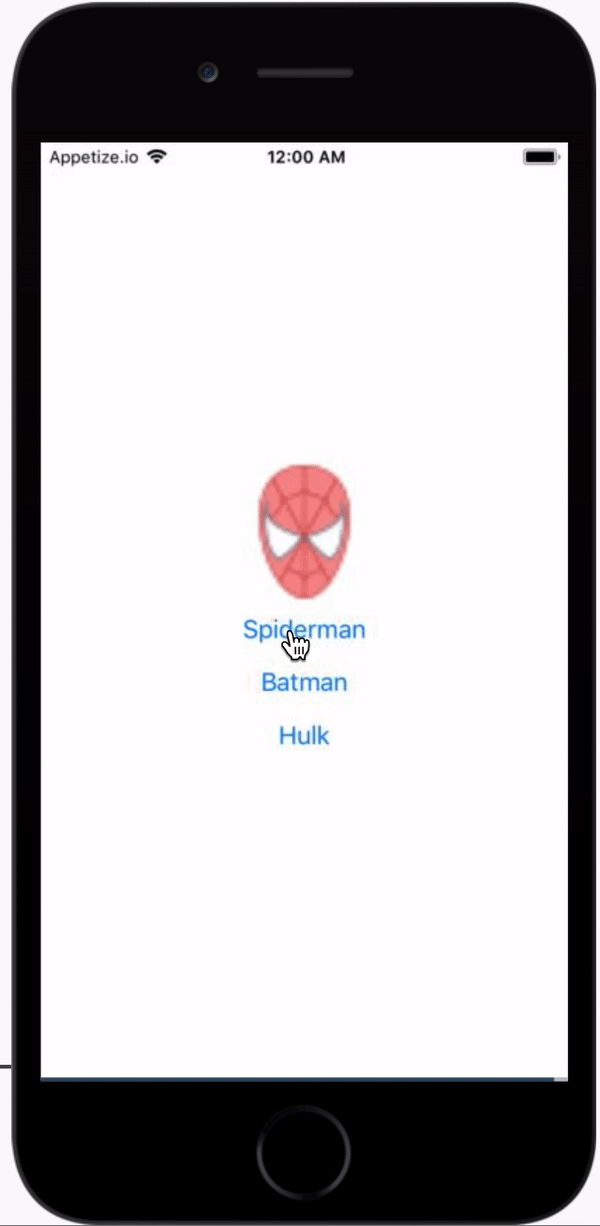React Native - Image Require Module using Dynamic Names
I\'m currently building a test app using React Native. The Image module, thus far has been working fine.
For example, if I had an image named avatar, th
-
import React, { Component } from 'react'; import { Image } from 'react-native'; class Images extends Component { constructor(props) { super(props); this.state = { images: { './assets/RetailerLogo/1.jpg': require('../../../assets/RetailerLogo/1.jpg'), './assets/RetailerLogo/2.jpg': require('../../../assets/RetailerLogo/2.jpg'), './assets/RetailerLogo/3.jpg': require('../../../assets/RetailerLogo/3.jpg') } } } render() { const { images } = this.state return ( <View> <Image resizeMode="contain" source={ images['assets/RetailerLogo/1.jpg'] } style={styles.itemImg} /> </View> )} }讨论(0) -
RELEVANT IF YOU HAVE KNOWN IMAGES (URLS):
The way I hacked my way through this problem:
I created a file with an object that stored the image and the name of the image:
const images = { dog: { imgName: 'Dog', uri: require('path/to/local/image') }, cat: { imgName: 'Cat on a Boat', uri: require('path/to/local/image') } } export { images };Then I imported the object into the component where I want to use it and just do my conditional rendering like so:
import { images } from 'relative/path'; if (cond === 'cat') { let imgSource = images.cat.uri; } <Image source={imgSource} />I know it is not the most efficient way but it is definitely a workaround.
Hope it helps!
讨论(0) -
First, create a file with image required - React native images must be loaded this way.
assets/index.js
export const friendsandfoe = require('./friends-and-foe.png'); export const lifeanddeath = require('./life-and-death.png'); export const homeandgarden = require('./home-and-garden.png');Now import all your assets
App.js
import * as All from '../../assets';You can now use your image as an interpolated value where imageValue (coming in from backend) is the same as named local file ie: 'homeandgarden':
<Image style={styles.image} source={All[`${imageValue}`]}></Image>讨论(0) -
This is covered in the documentation under the section "Static Resources":
The only allowed way to refer to an image in the bundle is to literally write require('image!name-of-the-asset') in the source.
// GOOD <Image source={require('image!my-icon')} /> // BAD var icon = this.props.active ? 'my-icon-active' : 'my-icon-inactive'; <Image source={require('image!' + icon)} /> // GOOD var icon = this.props.active ? require('image!my-icon-active') : require('image!my-icon-inactive'); <Image source={icon} />However you also need to remember to add your images to an xcassets bundle in your app in Xcode, though it seems from your comment you've done that already.
http://facebook.github.io/react-native/docs/image.html#adding-static-resources-to-your-app-using-images-xcassets
讨论(0) -
This worked for me :
I made a custom image component which takes in a boolean to check if the image is from web or is being passed from a local folder.
// In index.ios.js after importing the component <CustomImage fromWeb={false} imageName={require('./images/logo.png')}/> // In CustomImage.js which is my image component <Image style={styles.image} source={this.props.imageName} />If you see the code, instead of using one of these:
// NOTE: Neither of these will work source={require('../images/'+imageName)} var imageName = require('../images/'+imageName)I'm just sending the entire
require('./images/logo.png')as a prop. It works!讨论(0) -
As the React Native Documentation says, all your images sources needs to be loaded before compiling your bundle
So another way you can use dynamic images it's using a switch statement. Let's say you want to display a different avatar for a different character, you can do something like this:
class App extends Component { state = { avatar: "" } get avatarImage() { switch (this.state.avatar) { case "spiderman": return require('./spiderman.png'); case "batman": return require('./batman.png'); case "hulk": return require('./hulk.png'); default: return require('./no-image.png'); } } render() { return <Image source={this.avatarImage} /> } }Check the snack: https://snack.expo.io/@abranhe/dynamic-images

Also, remember if your image it's online you don't have any problems, you can do:
let superhero = "spiderman"; <Image source={{ uri: `https://some-website.online/${superhero}.png` }} />讨论(0)
- 热议问题

 加载中...
加载中...